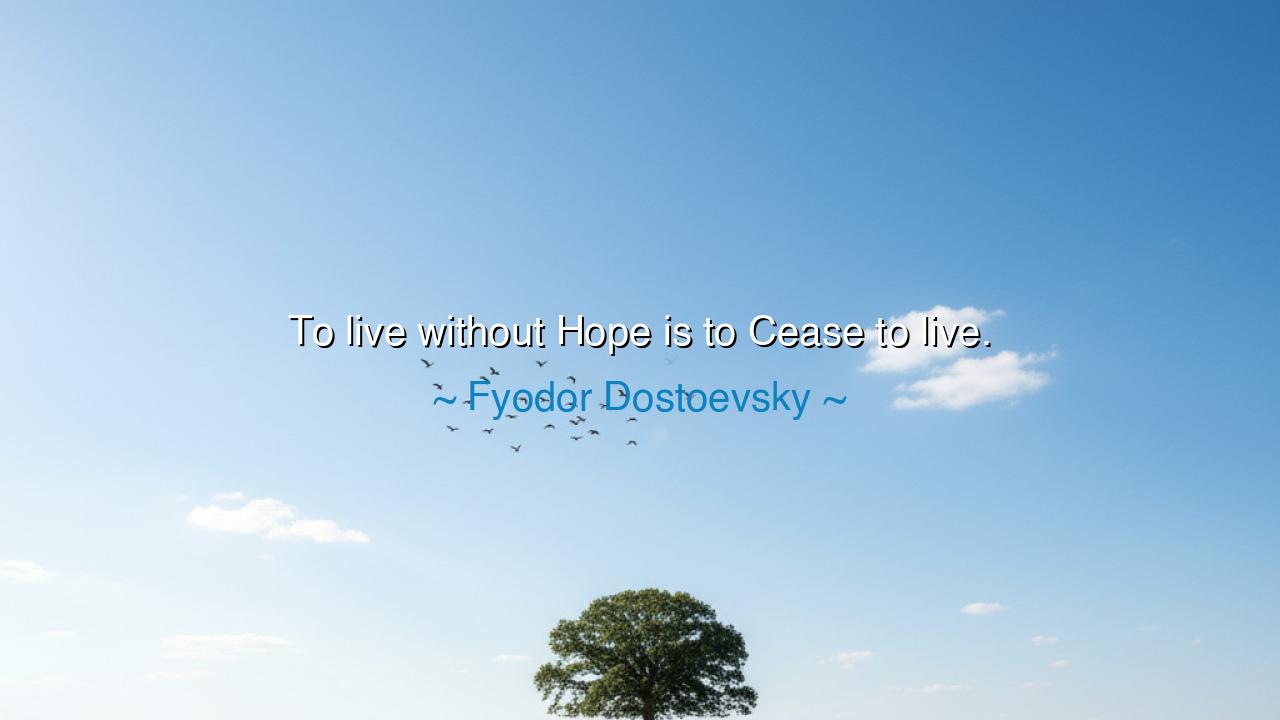
To live without Hope is to Cease to live.






“To live without Hope is to cease to live.” So wrote Fyodor Dostoevsky, the great Russian soul who saw both the heights of faith and the depths of despair. His words are not mere poetry—they are a cry from the core of human existence, a truth carved into the marrow of life itself. For in them lies this revelation: hope is not a luxury; it is the very breath of the spirit. Without it, a person may still move, still speak, still eat and drink—but they are as one already buried, alive in body but dead in soul.
In the age of the ancients, philosophers spoke of the flame within—that invisible light which gives meaning to labor, courage to endure, and vision to the weary. Hope is that flame. It is the unseen companion of every traveler, the voice that whispers “rise” when all seems lost. Dostoevsky, who knew suffering as few men ever have, wrote these words after being condemned to death, spared at the last moment, and sent to years of exile in Siberia. There, in the frost and silence of a wasteland, he learned that hope is not born from comfort—it is forged in pain. To lose it is to lose the will to continue; to keep it, even faintly, is to remain human.
Consider the story of Dostoevsky himself. As he stood before the firing squad, the blindfold waiting, the soldiers ready, he believed he had only seconds left to live. In that moment, when all things vanished—ambition, pride, future—what remained was a single light within: hope, not of survival, but of meaning. Later, when his sentence was commuted and he lived on, he wrote of that moment as a rebirth. He understood then that hope was not a dream of tomorrow’s comfort, but a defiance against the void—a holy insistence that life, even in suffering, still matters.
Throughout history, the great and the humble alike have survived by this sacred force. Think of Nelson Mandela, who spent twenty-seven years behind bars, robbed of the world’s light yet never surrendering his inner dawn. “I am not an optimist,” he once said, “but I am a prisoner of hope.” Though his chains were real, his spirit remained free. For he knew, as Dostoevsky did, that the heart sustained by hope can outlast even the longest night.
Without hope, civilizations crumble and souls decay. A farmer will not plant his seeds if he no longer believes in spring. A mother will not sing her child to sleep if she believes the world has no tomorrow. The poet will lay down his pen, and the laborer his tools, if hope dies in them. It is hope that pulls us through our weariness, that makes us raise our eyes to the sunrise and whisper, “One more day.” Hope is the heartbeat of life itself.
Yet, hope is not blind optimism. It does not deny sorrow or hide from truth. Dostoevsky’s kind of hope is fierce—it survives through doubt and darkness. It is not the promise that everything will turn out well, but the conviction that life is still worth living, even when all seems lost. It is the courage to say, “Though I walk through despair, I will not surrender to it.” That is the kind of hope that rebuilds nations, heals hearts, and restores meaning to existence.
So, what lesson shall we take from this? Guard your hope as you would guard fire in the cold. Feed it with gratitude, with love, with faith in the unseen goodness that still dwells in the world. When despair calls your name, answer with hope. When failure comes, stand again. When you see another stumbling in darkness, share your light. For to live without hope is to cease to live, but to live with hope is to join the eternal current of life itself—a river that flows, unbroken, through every storm.
And remember, children of tomorrow: no matter how deep the night, hope is the dawn already begun.






AAdministratorAdministrator
Welcome, honored guests. Please leave a comment, we will respond soon